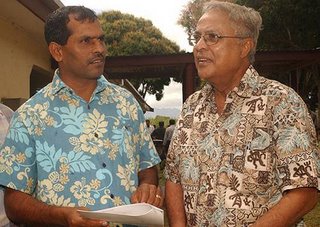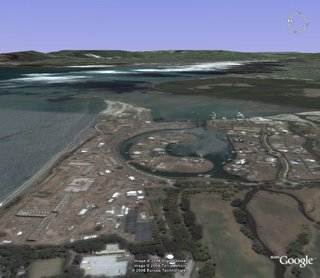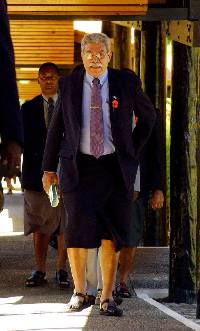U.N.D.P
induction workshop for Fiji M.P's is a wonderful step in the right direction
for the welfare of the nation. Arresting the down trend of human development is the objective that these Politicians must meet. Perhaps the electoral system would be in urgent need of repair also, especially
inlight of discrepancies by the Fiji Election Office.
 Chaudary and Vayeshnoi.
Chaudary and Vayeshnoi.Speaking of Politicans,
news of the chasm between certain members of Fiji Labour Party and their fire and brime stone leader Mahendra Chaudary, is another milestone in politics.
Perhaps a needed wake-up call for the party's icon and reminder that
democracy begins at home base.
On the matter of the
early release of Deputy Speaker, Coup convict and Chief for extra-mural activties, is a white wash of the fabric of justice, mirroring
despotic interpretations of the law by the
Machavellian Attorney General of Fiji,
Qoroniasi Bale. Ironically the
same individual who was involved in the drafting of the legal documents for the rebel government. The prime reason for the early release in now being
challenged by the Fiji High Court, underlining the weakness in
legal justifications created by the same Messr Bale-the
architect of the
controversial R.T.U Bill.
Mick Beddoes, Laisenia Qarase recently.
Justice that is confirmed to be un-evenly swayed towards the influential in Fiji's society.
Where are the towers of conscious in corridors of the legal fraternity?
Where are the so called guardians of the people- Fiji Law Society, The Ombudsman, Non-Governmental Organizations? Capital crimes should not be permitted for parole. Especially when the
main investigation for the coup planners and financiers are still yet to be presented in court.
Sitiveni Rabuka.
The powers of the Prison Commisioner must also be fast tracked for review if any sense of justice and natural law is expected to be prevail in Fiji. Another
parallel case involving 1987 coup leader for instigating mutiny in the post 2000 coup period, should be converged into a Parliamentary Enquiry.
Fiji's Telecom Parent company A.T.H Chairman has indicated their willingness to
de-regulate Fiji's industry. Surprisingly, the chairman now acknowledges the benefits of diversifying the industry players.
On the historical front, an
unexpected discovery of a U.S fighter plane from the World War 2 era in the remote highland of Fiji, may bring closure to a certain family in America.
On the matter of the Affirmative Action report by Fiji Human Rights Commission: S.i.F.M feels that this is an example of selective gatekeeping by the Fiji Times, on matters in the public domain that
embarrases certain circles. Fiji P.M, L. Qarase was
quick to assasinate the report's author instead of reviewing the contents.
It is quite reprehensive of the Prime Ministership to provide lip-service on multi-racialism and then turn around and elevate their legal standing above the supreme law of the land; the 1997 constitution. Accordingly the Affirmative Action program, as determined by the report, violates the first principles of government- that is the law.
To sort out this dispute it is expected that this particular case will go to court, judging from earlier episodes of constitutional ignorance displayed by the Attorney General. As a lawyer, the A-G should understand that ignorance is never a viable legal defense.
It is also laugable that, the same excuse of democracy which the P.M's office hides behind(especially on the matter of Army Commander's democratic role); is also the same law the government must abide by and has come back to haunt the P.M.
No office, no person is above the law- not even you Mister Prime Minister.Fiji Times Editor's reputation has fallen short of the grace of responsible journalism, departing from their usual unbiased commentary to become another tower of silence in Fiji Society. By avoiding contenscious matters, the absence of any comprehensive investigative columns or articles (on the investigation of 2000 coup)in their publication sums up the
their track record or perhaps the hidden agenda of the present Fiji Times editor Messr Samisoni Kakaivalu to echo the sentiments of S.D.L's billegerence.
Human rights
WILL the director of the Fiji Human Rights Com-mission tell the taxpayers of Fiji why she took six years and let two general elections pass before declaring that the Government's affirmative action program is unconstitutional?
For example, the commission said this week that $20million was given as a loan to Fijian Holdings Limited via the Fijian Affairs Board on an interest-free basis which was subsequently converted into an outright grant in the blueprint (FT 22/6).
All this happened six years ago. Unlike the complex National Bank of Fiji saga, the Agriculture scam and the coup investigations, the transfer of $20 million in taxpayers' funds to Fijian Holdings was a clear and uncomplicated matter.
Why did the Fiji Human Rights Commission sleep on it for six years?
Who needed the $20million more, the homeless destitutes who consider themselves lucky if they receive $2 a day from the Government or Fijian Holdings which boasts of huge profits for its shareholders every year?
Kanti Patel
Suva
Bias report
THE Fiji Human Rights Commission found something that is very delicate to the economic survival of the indigenous people of this country.
It said the affirmative action program is unconstitutional and it was sad and hard to understand.
It cites the Fijian Holdings Limited loan as an example and that alone makes me suspect that the writer of the report is not fit to be a member of the investigation team.
He was biased and reporting from a smoke screen environment.
Whoever edited the report was pre-determined to note publicly that the affirmative action program is unconstitutional and is only for Fijians.
However, if we are to screen the Constitution Amendment Act of 1997 concerning the issue raised here, the report can only be right if there is data to support that the program was used to oppose Chapter 4 (Bill Of Rights) of the Constitution.
Social justice states that the affirmative action program must have: a goal; intended beneficiaries (either an individual or a group) to be assisted to achieve the goal; performance indicator for assessment of the success of the program, and; a criteria for the selection of beneficiaries if the benefactor is a group.
The Constitution also says in the same chapter that the Social Justice Act is to provide access for the disadvantaged to participate in commerce at all levels.
In view of the constitutional provision, I find it hard to believe that the affirmative action program is unconstitutional and only for Fijians. The problem however could be the complainants for not being able to set goals for their intended beneficiaries.
Fijian Holdings has proven itself, according to the Constitution. The beneficiaries cover all indigenous age groups as required by the Constitution and I thought picking on Fijian Holdings as an example was racist. The loan mentioned to be converted to a grant can only be done with the approval of Parliament, which the complainant the Labour party was and still is a member of.
To mention that Indians are the poorest household in rural areas is racist as well. The point here is for the complainant to provide goals, criteria, and scenarios for the disadvantaged so that they can qualify for the provisions in the Social Justice Act.
Samuela Uluikadavu
Davuilevu
In response to K. Patel's letter and and Samuela Uluikadavu's one of similar tone, this is an email S.i.F.M received deliberating on the matter, which the Editor of Fiji Times did not feel appropriate to publish. Although the editor did choose to publish other letters denouncing the Fiji Human Rights Commission, it felt other opposing views on the subject would not be entertained. Fair and balanced.
Fiji Times
Letters to the Editor
Dear Sir,
Samuela's Uluikadavu's letter to the Editor(F/T June 25th 2006) and Kanti Patel's letter (F/T June 30th) castigating the Fiji Human Rights Commission report on the Affirmative Action programs was entertaining for the wrong reasons.
At a glance, the main thrust of [their] letter[s] is way off the mark in factual information; I would certainly archive [their] pithy comments under the fiction column and perhaps political satire.
Mr Uluikadavu's accuracy, reminds me of an old proverb: "From the sublime to the ridiculous is only a step".
Affirmative Action Program is not essential to the survival of indigenous commerce.
It is the catalyst to a dependency attitude reinforced with a sense of entitlement. The qualities which encapsulates Fijian Holding's business model.
Ironically the same Fijian Holdings whose boardroom was documented in the Fiji media, as the venue for the 2000 Coup planning. Another old proverb should remind Fiji as a nation, of the repercussions of such behaviors: "Set a beggar on a horse and he'll ride to the Devil".
Club Em Designs

































